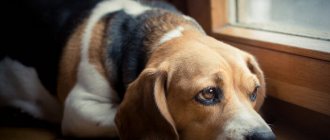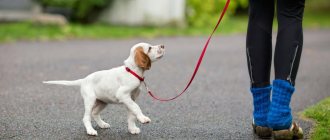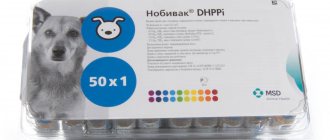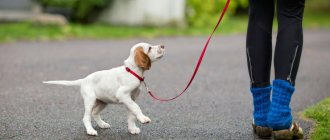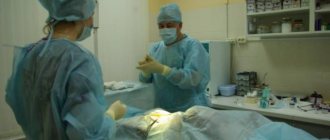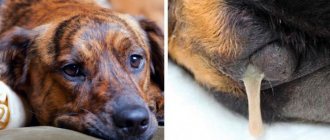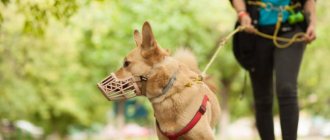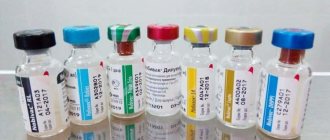Preparing your dog for vaccination
Since vaccination is the introduction of live but weakened strains of microbes and viruses into the body in order to induce immunity to diseases, it should only be carried out on a completely healthy animal that has been treated for parasites (worms and fleas). Worms weaken the four-legged immune system. Therefore, it is important to deworm the animal 10-14 days before vaccination.
Currently, veterinarians recommend the following drugs for helminthiasis: Milbemax, Kanikvantel plus, Drontal. When using, the manufacturer's instructions should be strictly followed. To avoid addiction, it is recommended to change medications periodically.
If after helminthization the parasites have not disappeared, vaccination should be postponed and the animal should be re-treated for worms (according to the instructions for the selected drug). Otherwise, the body of an animal with a weakened immune system may simply not be able to cope with even a minor virus, and the dog may die.
Types of vaccinations
Thanks to the vaccine, immunity is developed, but its strength depends on the method of introducing the drug into the body of the vaccine itself.
All vaccines that exist in this industry are divided into two types:
- Living (MLV). Contain modified or weakened but live viruses. It enters the body in a state that is not capable of causing harm to the pet’s body. But its presence will help develop lasting protection against similar, but not weakened, viruses that cause disease. The immunity created in this way is formed very quickly and remains for a long time. It is mainly produced in lyophilized form - waxy.
Create protection against such pathogens:
- plague;
- hepatitis;
- parvovirus enteritis.
Before vaccination, the lifestyle of the owners must be taken into account. The most effective, safe and effective “live” vaccination drug is Nobivak.
- Dead (KV) – inactivated. They act differently than “living” ones, and more of them are needed, because “dead” ones cannot reproduce independently in the host’s body. For the same reason, additional substances are needed that are introduced along with viruses. The doctor decides exactly how many vaccinations need to be given, but they are given every few weeks.
Having a liquid structure, they are easier to administer and work against the following pathogens:
- rabies;
- leptospirosis;
- parainfluenza.
Which vaccine is best to vaccinate a dog?
Today there are many polyvaccines, both imported and domestically produced. All vaccines have undergone clinical trials and are not particularly different from each other. The use of any of them promotes the development of immunity. But if you are going to travel abroad with your dog, then the requirements of, for example, the European Union for the non-commercial movement of pets limit the list of vaccines used.
If you plan to travel around the world with your dog, then imported polyvalent vaccines such as Nobivak, Eurican, Duramun are recommended.
You can read in more detail about preparing your four-legged dog for vaccination and about the vaccination schedule from birth.
So, you have properly prepared the animal for the procedure and vaccinated it. I have already written that after vaccination the animal’s immunity is very weakened, so the risk of contracting a viral disease is very high. Therefore, after vaccination, quarantine should be strictly observed.
The need for quarantine after rabies vaccination
Why is it so important to follow all doctor’s advice and observe quarantine after rabies vaccination? In most clinical cases, the rabies vaccine is used after the threat of probable infection with the disease has appeared (that is, after the bite of a wild or infected animal).
Therefore, the effect obtained after vaccination allows you to save the patient’s life by preventing the progression of infection in his body.
It is necessary to follow all doctor’s orders for several reasons:
- this will protect the immune system from negative side effects that reduce its activity and prevent the development of immunity in sufficient quantities;
- such actions help prevent depletion of the immune system and infection of the body with viral seasonal diseases;
- quarantine will make it possible to prevent post-vaccination complications of vaccination.
Is it possible to walk a dog during quarantine?
As for adult animals, dogs can and should go for walks after vaccination. However, some restrictions must be adhered to. Quarantine restrictions for adult animals are quite conditional:
- Reduce walking time to a minimum, especially in rainy and frosty weather.
- If possible, avoid contact with other animals, especially stray dogs.
- Avoid increased stress, overwork and hypothermia.
As a rule, an adult healthy animal can lead a normal active lifestyle within a week.
As for puppies, everything is much stricter here. A puppy develops stable immunity only after 2 or 3 vaccinations (depending on the vaccination schedule) and a strict 14-day quarantine after them.
As a rule, at 3.5 months the puppy receives its last annual scheduled vaccination. And after a 14-day quarantine (after this vaccination), the puppy is already allowed to go outside for a walk. Until then, you should adhere to the following rules:
- You should not let your puppy run on the ground. If you can’t wait to show your little tail the world, then at this time you can walk the baby exclusively in your arms.
- It is imperative to protect the puppy not only from contact with other dogs, but also from contact with pets that have access to the street. For example, you have a cat living in your house that “walks by itself.” So this cat can bring an infection into the house on its paws or fur. Until you have received all the necessary vaccinations and during the quarantine period after them, try to keep the puppy and the “walking” cat in separate rooms.
- You should also minimize contact with objects that are potential carriers of infections, such as outdoor shoes.
- To prevent your puppy from becoming infected, clean your house regularly. The floor can be wiped with water and potassium permanganate.
- It is better not to take a small puppy without strong immunity to a veterinary clinic for vaccinations, where he can pick up the virus. It is advisable to do the first vaccinations at home. If this is not possible, then try to protect the baby as much as possible when visiting a veterinary clinic.
Rules of conduct before and after puppy vaccination
Here we will discuss what restrictions should be followed before completing the first course of puppy vaccinations, what to pay attention to when preparing for vaccination and how to avoid post-vaccination complications.
The main task is to reduce the chances of the puppy becoming infected
. Avoid contact with dogs and other animals, street walks (places where dogs congregate are especially dangerous), follow the rules of hygiene, do not allow the puppy to come into contact with street objects, clothes, shoes (about the risk), (about the first walk).
If it is impossible to minimize contact with the outside world and the puppy is at high risk of infection, the administration of serums
with ready-made antibodies that form short-term passive immunity (about serums).
deworming 2 weeks before the planned vaccination date.
(more details). This is necessary because the presence of parasites in a dog’s body significantly weakens the immune system. You should also make sure that your pet does not have external parasites (lice, fleas).
2-3 days before vaccination, it is recommended to measure the puppy’s body temperature daily. Normal temperature should be between 37.5°-39°C. Pay attention to the puppy’s appetite, its activity, absence of digestive disorders, discharge from the nose and eyes (about preparation for vaccination).
Remember that only healthy dogs can be vaccinated
. If anything is suspicious, be sure to consult a veterinarian.
allergic reactions for several hours.
: is there any weakness, shortness of breath, excessive salivation, pallor of the mucous membranes (more details).
If possible, protect your dog from various stressful situations.
: transportation, change of habitat or feeding diet, do not allow overheating or cooling, do not wash the pet. Avoid strenuous physical activity.
Immunity is formed approximately two weeks after the final vaccination.
The use of anthelmintic for puppies before vaccination is mandatory! Worms, especially in large quantities, suppress the immune system and can lead to complications and the creation of insufficient immunity to vaccinated diseases.
Deworming is carried out 2 weeks before vaccination, the drug is prescribed according to the weight of the animal. If possible, for several weeks before and after vaccination, minimize stress on the puppy, such as transportation, visiting unfamiliar places, and bathing.
Immediately before vaccination, make sure that the puppy is healthy (any doubts should be shared with your veterinarian).
How to prepare an adult dog for vaccination?
Preparing an adult dog for vaccination, just like for a puppy, involves deworming, protecting from stress and monitoring its health. The difference is that the body of an adult dog is much stronger, which does not require such restrictions as with a puppy.
Why worm your dog before vaccination?
Dogs are very susceptible to infection with helminths, since they often come into contact with the ground, various outdoor objects and relatives. Worming dogs before vaccination is necessary to strengthen the animal’s immune response to the vaccine and also to avoid complications in the post-vaccination period.
What is the best anthelmintic for dogs to give before vaccination?
Deworming a dog before vaccination is a very important procedure, so the choice of drug and the required dosage must be taken seriously.
The first thing to find out is the dog's weight, since the amount of anthelmintic depends on body weight. For adult dogs, it is advisable to use combined drugs against tape and round parasites.
To deworm puppies before vaccination, it is recommended to use low-toxic drugs containing pyrantel.
Should you feed your dog before vaccination?
There are no special contraindications to feeding an animal before vaccination, however, if the dog, for example, gets sick in the car, it is better to feed it after returning home.
What rules must be followed when vaccinating dogs?
Before vaccination, the dog should be examined, body temperature measured, and asked a few questions about general health and allergies. Vaccination should be carried out with a sterile disposable syringe, the injection site should be treated with medical alcohol. Also note that vaccine vials must be stored in the refrigerator.
Is it possible to wash a dog after vaccination?
The question of washing a dog after vaccination interests many pet owners. After all, often after a walk it is necessary not only to wash the paws, but to completely immerse the tailed “dirty one” in the bath...
However, all veterinarians strictly prohibit bathing your pet. This is again due to the fact that the four-legged immune system is greatly weakened, and any hypothermia after water procedures can cause a cold.
It is recommended to wash your dog after vaccination no earlier than 6-7 days. It’s better to wait until the quarantine is completely over and the dog has developed immunity.
Well, if the situation is completely hopeless, and your little tail has had such a “good walk” that it is not only impossible to let him on the sofa, but even scary to let him through the threshold of the apartment, then there is nowhere to go - you need to wash him!
But at the same time, you should protect your four-legged animal as much as possible from possible hypothermia:
- Wash your fluffy with warm water.
- After bathing, dry thoroughly and wrap him in a dry towel.
- To avoid drafts, close all doors to the room where the dog will be so that he can dry thoroughly.
What not to do after a rabies vaccination for a person: main contraindications
To get the maximum effect from an anti-rabies (anti-rabies) vaccination, doctors recommend that patients follow the following rules for six months after it:
- do not drink alcoholic beverages, which help reduce the formation of immunity and have a bad effect on a person’s health in general;
- do not stay in direct sunlight for a long time and refrain from sunbathing in a solarium;
- completely eliminate heavy power loads, intense sports, replace working conditions (if the work involves physical labor) with more gentle ones;
- do not expose your body to severe overheating or hypothermia, always dress according to the season;
- avoid nervous tension, severe emotional stress and conflict situations that can significantly worsen mental health;
- do not interrupt the course of treatment prescribed by the doctor without his permission (if there are indications for discontinuation of anti-rabies therapy).
In addition, the effectiveness of rabies vaccination can be affected by other factors that often occur in the post-vaccination period, in particular:
- dysfunction of internal organs or diseases of the immune system, as well as cancer that develops or worsens within 6 months after vaccination;
- long-term use of drugs from the group of immunosuppressants, which inhibit the activity of the immune system and disrupt the normal formation of immunity;
- incorrect technique for administering the vaccine or poor quality of the solution;
- violation of the vaccination regimen due to the fault of the patient.
To ensure that sufficient protective antibodies have been formed, the patient should undergo periodic blood tests. Such a study will make it possible to verify the presence or absence of immune complexes in the serum and judge the quality of immunity against rabies.
Possible complications after vaccination
Complications after vaccination can be local and general.
Local complications are exactly the same bump that I have already talked about. In some cases, the site where the vaccine was given may feel hot and painful to the touch.
General complications are characterized by the following signs: the dog looks lethargic, refuses to eat, and the body temperature may rise slightly. Mostly, such complications occur immediately after vaccination and disappear after a few days. If the painful condition persists, you should see a veterinarian.
There are times when some medications can cause an allergic reaction. Allergy symptoms are: increased salivation, weakness, shortness of breath, blue discoloration of the mucous membranes of the mouth. If such symptoms are present, the dog should be taken to the vet immediately.
This should not be taken lightly, because taking all necessary precautions will help your pet cope with this difficult period and keep him healthy for many years to come.
Walking a puppy without vaccinations
It was said a long time ago that it was a bad idea to take out puppies when they had not completed their vaccination schedule, that is, until they had received the latest vaccine they should not go out for walks because they were not protected from diseases and could become infected. This is partly true, since without the protection that vaccines offer, they can contract some diseases, but this leaves aside a fundamental fact: the importance of a puppy's socialization stage .
© shutterstock
In general, the socialization stage lasts from one month to three months of a dog's life, so it largely coincides with the period in which the animal receives vaccines. During this period, puppies typically learn the behavior of canine species and establish relationships with their environment. That is, he begins to understand the world around him and the people, objects and animals that are in it.
Poor socialization can cause, among other things, fears and phobias. This is because, as already stated, during the socialization stage, puppies begin to exhibit things such as cars, motorcycles, other dogs, children, people of different races and the like. Thus, it is very convenient for them to assimilate them then, so that later, as an adult, they do not recognize them as something strange and harmful to fear. It is therefore beneficial to go outside during this period for the animal's future mental health, and the fact that a dog has not completed its vaccination schedule does not mean that it should become a "house dog" isolated from the world. Thus, we see how you don’t need to wait for a specific vaccine to start taking your puppy outside. Of course, extreme precautions must be taken to prevent them from contracting diseases that can be fatal, such as canine parvovirus.
Why does a puppy need walks?
During the walk, interpersonal connections between the dog and the owner are established.
With proper organization of periods of activity and rest, the puppy receives the necessary physical activity, and its nervous system is formed. Important! Exercise should be a joy for the puppy. There is no point in forcing him to do something by force.
To prevent the dog from getting tired of walks, they need to be done more often, but shorter in time. After basic vaccinations, the frequency of walks should be at least 5 times a day.
Getting to know the outside world begins even before vaccination. True, it passes in the hands of the owner. Even this form brings positive results. Many owners neglect going out with their small pets. The main excuse is that there are a lot of infected animals on the street, although a lot of things get into your home with street shoes. In any case, the baby will come into contact with the brought infection. It might even get infected.
The difference between greenhouse dogs and actively walking dogs is that the latter gradually acquire immunity against any infection precisely on walks. Pets are deprived of this, so even a small dose of pest viruses can be dangerous for them. They get sick longer and more severely.
Walking a labrador puppy
The second point is that the pet dog does not learn social coexistence skills. Experience communicating with representatives of your class is acquired from 4 to 8 months. It is much easier for a puppy to learn to live in the city, not to be afraid of people, cars, noise, or other animals in an environment. The psyche of children is quite plastic.
A slightly older dog explores the world on walks. To prevent this process from getting out of control, the owner must plan walks wisely. If at first walking was carried out in quiet places, then gradually the pet should be introduced to busy areas.
Need to know! It is important for your puppy to change routes regularly. The more knowledge he receives, the more adequately he will behave as an adult.
In order not to become an attachment to the leash, the pet must be given loads throughout the entire walk. Elements of training should be gradually introduced.
Walking is of no small importance in fulfilling the natural needs of the animal. This is especially important for large breeds. If dwarf representatives (Yorkie, Spitz, Chihuahua) can be allowed to walk in a diaper, large ones (Dachshund, Husky, German and East European shepherds, Labrador, etc.) should not be allowed to do this even at a tender age.
The dog needs to empty its intestines and bladder 3-4 times a day. They can tolerate it, but then problems arise with the genitourinary system. Long-term restraint leads to chronic diseases, for example, urolithiasis.
We suggest you read: How to train a puppy to use a leash? How to teach a dog to walk next to you? Accustoming a puppy and an adult dog to a collar
Swimming is very useful for the general development and strengthening of the dog’s physical condition. You can start doing this from the age of three months.
